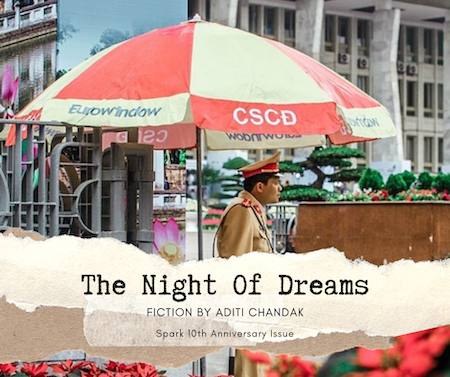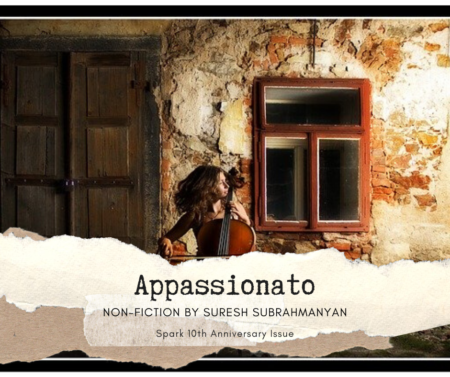by Aditi Chandak
Aditi Chandak captures a scene out of the common man’s life to weave together stories of passion and what it could mean to different people.
The security guard sat flipping through the last few pages of his handwritten notes, intermittently checking the road beyond the cast iron gates and back towards the seven-storeyed building he was supposed to be taking care of. Almost everyone was in, from what he recalled. The Delhi winters were going to be the worst in a couple of decades this year – or so the newspapers said. And with the bitter cold would come the eerie silence of the night, cats more frequent than burglars. The silence of the night and terrible internet connectivity in his little security guard hut kept him focused on his books. The lights went off in the second-floor drawing room.
That was the Rahejas, the guard thought, wrapping up the day after dinner. Young couple, no children, husband arrogant, wife – what was that word they’d mentioned in the papers the other day? – umm, docile.
The lights in the drawing room went off at the Rahejas’. Dinner was a quiet affair, with the mister flipping through news stories on his phone to save time and the missus. serving him second helpings without him realising. ‘This deal needs to go through or we won’t be meeting our targets for the quarter,’ he murmured, as the news channel droned on about the protests across the country over the NRC and the Citizenship Amendment Act. All distractions from the falling economy, he thought. No one wanted to be answerable for falling GDP numbers or the country’s lack of ease of business. ‘They’re all together in it,’ he told the missus. ‘One politician will pass a remark on rapes, another on religion, one will talk about Kashmir but no one wants to discuss the real issues – where will the five trillion dollar economy come from?’ She simply nodded her head, chomping on a mouthful. He never asked her what she thought, never felt the need to; making money was his thing, hers was to spend it. While she picked out his clothes for the next day, he took his laptop and sat in the balcony. He wanted to crunch the numbers again, just in case the deal didn’t go through. By the time he’d be done, the US markets would be in the middle of their day – he wouldn’t have to wake up in between. His sleep cycle had adjusted to the markets around the world – middle of the night to check on NASDAQ, early morning for HKEX and during the day, NIFTY. He was very close to earning enough for a new villa he wanted. It was going to be another long night, but this was the best part of his day. The missus flicked on the lights in the balcony for him.
The guard wasn’t in the mood to read more about why Gandhi chose to side with Jinnah, despite Ramachandra Guha’s feeble attempt at make it interesting. He wanted to read poetry, whose joys he was slowly discovering. But he remembered, with some guilt, that Guha was an assignment he had to complete; he paused for a moment and decided to get back to Gandhi and Jinnah some other night. He was distracted by a murmur of voices coming from the building. He peeped out to see if someone needed help. It was Neelam Didi and her mother. She’d given him some of her books from graduation, where he’d first read the poetry of Wordsworth and Maya Angelou and Nissim Ezekiel. She was helpful and amicable, so was her mother. He waved at them as they walked by, covered in enough layers to start sweating by the end of the walk.
‘Neelam, you should have seen her face last night when she entered the pub! Actually, you should have seen mine too. It felt like another world altogether. There were lights but not enough to let me see my food. There were people but none to make conversation with. And everything just seemed so fancy.’
‘But did you get a table immediately?’ Neelam asked, slowing down her pace for her mother.
‘Oh yes. The manager was really nice. I only had to mention your name and he seated us at a table in the corner from where we could see the entire club,’ the mother said, looking at her daughter proudly. ‘The only problem was that the washrooms were at the other end, so Dida had to walk around a bit more than she’d have liked to, especially with people staring at us.’
‘But we knew that would happen, right? I’d told you. But tell me about Dida! I wish you would have let me accompany you.’
‘Dida wouldn’t have been comfortable. Or so I thought.’
‘What do you mean?’ Neelam asked, curiosity slowing down her pace further.
‘While the music was playing, throughout dinner, she kept drumming her fingers. Even when I took her to the dance floor, she was very nervous… but thirty seconds on the floor and she’d forgotten that I existed! Or that her joint pain existed. Or that she was sixty-five!’
‘She didn’t hurt herself in the crowd, right?’ Neelam asked, concern for Dida in her voice. Neelam had never met Dida, who was one of her mother’s patients in her role as a caregiver, or a nurse, as they were called in India. Neelam knew that it did tire her mother out on some days but she loved being around for them as long as was medically possible.
‘I was afraid of that too but Dida just took to a corner, away from the kids, and swayed. I wanted to take a video for you but I was so mesmerised by her, I didn’t want to take my eyes off.’
‘Oh, I wish I had her passion for life. Or your passion for adventure, Mummaa!’
‘You will, my dear girl. You will. Much more than us, I hope. Anyway, how was your trip?’
The guard’s eyes fell on the newspapers thrown out for the day, and he pushed aside thoughts of poetry from his mind and picked out The Hindu and National Herald from the pile. He didn’t realise when Neelam and her mother went back upstairs; he was busy reading the National Herald, pausing at an article titled “India’s rape culture: Rape amidst ‘religious fervour”’. He didn’t understand what ‘fervour’ meant. He looked up its meaning in the tattered Oxford pocket dictionary Neelam Didi had given him. Similar to passion, he noted mentally. Just then the main gates rattled, causing him to rush out to see who it was. It was her again. Why did she do this to herself? And did it not scare her, being out on the streets of Delhi at this hour?
‘Sorry! Did I disturb your reading? I couldn’t go in the morning today, so…’ she said, lightly jogging her way to the building entrance. She’d seen the look on his face and knew what he was about to ask. She didn’t wait to respond because she really couldn’t explain why she did what she did! It worried her, yes, but she couldn’t stop living because of fear. Each time the prime time news flashed a new case of assault, sexual or otherwise, her parents worried, her brother worried, she worried, her friends worried – and she would hit the gym more often than the parks or streets then. And soon after, it would become just another story. Her workout routine aligned itself to the headlines spattering the papers. She entered the lift and pressed seven. She would first stretch a bit and then down the protein shake for dinner. She hoped Brother would have prepared it by now. It was he who had introduced her to weight training, strength and conditioning, HIIT. He’d keep rattling off his progress over the phone when he’d joined college, working out with his friends. Once back, he got her to start training too. And now while he’d slowed down, she couldn’t sleep without having hit the high on her heart rate every day. She checked the fitness tracker app on the phone. She’d clocked her ten kilometres in just above an hour. She was disappointed – her brother’s best was fifty-five minutes. Stretching, foam rolling, a shower later, she was ready to hit the bed, rushed that she’d pushed herself to her limits yet another day and survived!
A clock chimed in the distance – it was the midnight hour. The guard returned from his rounds, ensuring there were no misplaced cats or burglars around. He could now get back to his books without interruption. His father had worked hard to see him through school. He’d now chosen to work hard through college for his father. He opened his notebook and read, for the umpteenth time, his favourite quote from the film Dead Poets Society that he’d scribbled on the first page. The movie had left quite an impression on him – he had watched it when he was convincing his family that he wanted to do a degree in English and not in the seemingly lucrative options of Commerce or Business Administration. ‘We don’t read and write poetry because it’s cute. We read and write poetry because we are members of the human race. And the human race is filled with passion. And medicine, law, business, engineering, these are noble pursuits and necessary to sustain life. But poetry, beauty, romance, love, these are what we stay alive for.’
Aditi Chandak was raised in Calcutta and now resides in Bangalore. She’s a Chartered Accountant during the day to pay the bills, but the rest of her hours are spent writing, reading, sketching and travelling. Her debut novel ‘Under The Crescent Moon’ is awaiting publication. She can currently be found blogging at ‘Inking The Thinking’.






